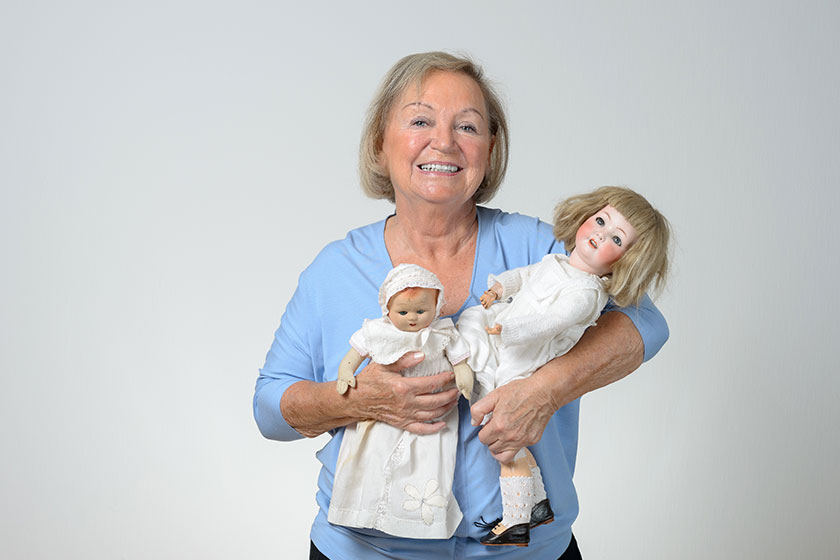Dementia is a complex and challenging condition that affects millions of older adults worldwide, making it a top concern for families and caregivers. As dementia progresses, individuals often experience behavioral and psychological symptoms that can be distressing for both them and their loved ones. In the quest to improve the quality of life for older adults living with dementia, various innovative therapies have emerged. One such therapy gaining attention is doll therapy, a practice thoughtfully integrated into care at Morada Friendswood, where we explore the effectiveness of this treatment and its potential benefits for older adults in senior living homes.
Understanding Doll Therapy
Doll therapy involves providing individuals with dementia, particularly those in the moderate to advanced stages, with lifelike dolls or stuffed animals to nurture and care for. The goal is to create a sense of comfort and emotional connection reminiscent of caring for a real baby or pet. This therapy is based on the idea that engaging with dolls can trigger positive memories and emotions, reduce anxiety and agitation, and improve overall well-being for dementia patients.
Moreover, doll therapy can serve as a valuable form of non-pharmacological intervention for individuals with dementia, offering an alternative to medications that may have side effects. By providing a lifelike doll or stuffed animal, caregivers and healthcare professionals aim to tap into the individual’s nurturing instincts and provide a source of comfort and companionship. This approach can help individuals with dementia feel more grounded and connected to their surroundings.
The Impact of Dementia on Older Adults
To comprehend the effectiveness of doll therapy, it’s essential to first understand the challenges posed by dementia. Dementia is a progressive neurodegenerative disorder characterized by a decline in cognitive function, memory loss, impaired communication skills, and behavioral changes. These changes often lead to increased anxiety, depression, aggression, and social withdrawal in individuals with dementia.
As dementia progresses, individuals may struggle to recognize their loved ones or even remember their own identities. This loss of self-awareness and the ability to engage in meaningful interactions can be incredibly distressing, not only for the individual but also for their caregivers and family members. Understanding the profound impact of dementia on older adults highlights the importance of seeking effective interventions, such as doll therapy, to improve their quality of life.
Furthermore, dementia affects not only cognitive function but also physical health, making it crucial to address both the psychological and physiological aspects of care. Doll therapy can play a role in promoting emotional well-being and reducing the challenging behaviors associated with dementia, ultimately enhancing the overall quality of life for those living with this condition.
Doll Therapy Benefits
One of the key benefits of doll therapy is the emotional comfort it provides to older adults with dementia. Many individuals with dementia find solace in caring for and holding a doll, which can help reduce feelings of loneliness and anxiety. The act of cradling a doll can evoke nurturing instincts, creating a sense of purpose and contentment.
Doll therapy has been observed to reduce agitation and restlessness in dementia patients. Engaging with a doll can divert their attention from distressing thoughts and behaviors, providing a calming effect. This can lead to improved overall behavior and a more peaceful environment in senior living facilities.
Older adults with dementia often struggle with social interaction. Doll therapy can stimulate conversations and interactions between caregivers and residents. It provides a shared experience that can lead to more meaningful connections and improved communication.
Dementia can be a disempowering condition for older adults, as they lose control over many aspects of their lives. Doll therapy allows individuals to regain a sense of control and autonomy by taking care of their dolls. This sense of purpose can be highly therapeutic and boost self-esteem.
Controversies and Criticisms
While doll therapy has gained popularity as a dementia care intervention, it is not without controversy and criticism. Some experts argue that it may infantilize older adults or prevent them from engaging in more socially meaningful activities. Additionally, it may not be effective for all individuals with dementia, as personal preferences vary widely.
Assessing the Impact: The Efficacy of Doll Therapy in Dementia Care
Doll therapy is a novel approach to dementia care that has shown promise in improving the emotional well-being of older adults living with dementia. While it may not be a one-size-fits-all solution, its potential benefits, such as emotional comfort, reduced agitation, enhanced social interaction, a sense of control, and positive reminiscence, make it a therapy worth considering for individuals in senior living options. Caregivers and families should carefully assess its effectiveness on an individual basis and consult with healthcare professionals to determine if doll therapy is a suitable addition to a loved one’s dementia care plan.







